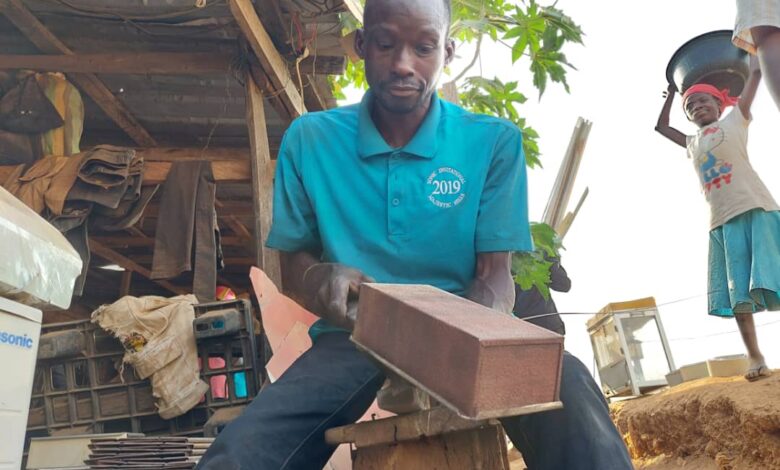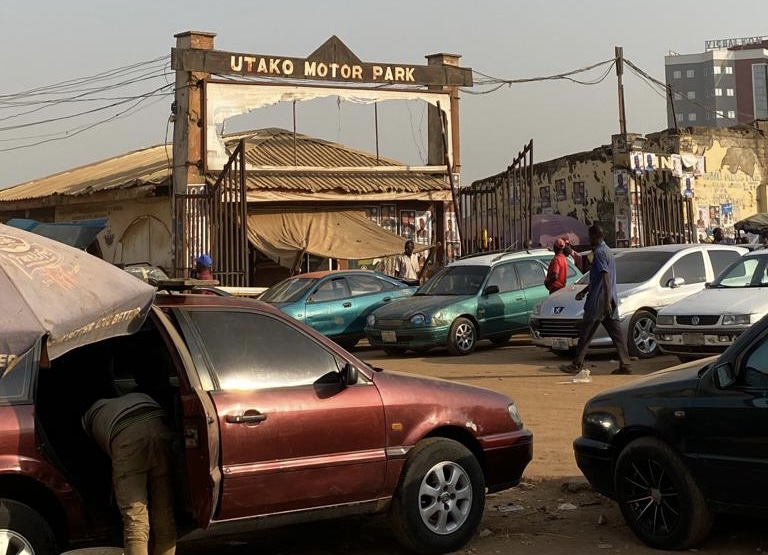Recycled Waste Is Creating Economic Opportunities In Abuja Motor Park
At Utako Motor Park, Abuja, North-central Nigeria, recyclers are fashioning out valuable tools from waste products.

Aliyu Abubakar, 32, known by his associates as Ali Yaro, uses discarded aluminium materials to fabricate kitchen utensils in the Panteka (spare parts) section of a market located within Utako Motor Park, popularly called Jabi Park in Abuja, North-central Nigeria.
Abubakar, who currently serves as secretary of the Fairly-Used Aluminium Association, has been in the business of recycling aluminium materials for over 15 years.
“I started this business when I was in primary school,” he said, adding that he earns about N30,000 or more a day depending on how many items he sells.
The income from the trade sustains him and his family of two children— three years, and two months old respectively.
Panteka, a recycling centre with makeshift workstations and sections for reusable items is also a haven for teenagers who pick up waste materials from rubbish bins around affluent areas of Abuja, and sell them to fund their education.
The market in Abuja also comprises a section for the sale of reusable household items that would have ended up in dumpsites. Over “4,000” members make up the association in this part of the market.
The chairman of the reusable section of the market, Muhammad Sanusi, and his predecessor, Samaila Kangiwa, told HumAngle that traders collect reusable items, refurbish and sell them back to the public. The items are cheaper when compared to the ones in stores.

Waste business and environmental implications
In Nigeria, the informal metal recycling industry creates job opportunities.
Aside from the money-making aspect, there is also environmental merit to recycling; the trade helps to reduce waste generation and problems associated with disposal.
Having realised the vast prospects of recycling, the traders and fabricators in Jabi took steps toward making use of the opportunity. They formed a union to organise and oversee their activities.
Kangiwa, the ex-chairman lamented that their major challenge is the lack of a permanent and conducive workplace.
His ordeal is not different from that of others, like Abubakar.
“We have written severally (sic) to the government to help us get our own space so we can work adequately, but all in vain,” he said sadly.
The growing activities of waste collectors help in reducing the menace of waste and potential environmental challenges.
“Waste significantly lowers the quality of the environment in different ways, including through pollution of the air during incineration and land pollution when indiscriminately dumped,” says Ibrahim Usman, who owns a recycling plant in Kaduna.
Nigeria collected is one of the largest producers of waste in Africa. Findings show that the country generates more than 32 million tons of solid waste annually, out of which only 2o to 30 percent is obtained.
Waste management in the country faces significant challenges, including inadequate financing, the fast growth of the population, and poor investment in infrastructure development.
According to Ibrahim, the government doesn’t need to reinvent the wheel in handling waste. There are all kinds of successful models already existing and working in various places around the world.
He further said the first and most important step that needs immediate adoption is waste sorting beginning from homes where it is graded and packaged.
“For example, plastics should be packed separately, so also bottles, metals, and biodegradables like kitchen waste and so on,” he urged.
“When this is done from homes, it has already eliminated the complications by over 80 per cent.”
“Waste is a sector that has lots of potential which is currently being underutilised. Metal waste is the most profitable as it is bought at better rates compared to plastics or paper waste”, Says Sadiq Aliyu founder of Ecocykle, an organisation that focuses on promoting environmental awareness and creating innovative solutions.
According to Aliyu, there are lots of scrap collectors across every state in Nigeria, the majority of whom are informal collectors. He further adds that “they gather tonnes of waste with the aid of scavengers and transfer to major dealers who buy and either ship the waste out of the country or recycle them into new products here in Nigeria.”
Potentials of scrap business in Nigeria
The recycling business has the prospect of becoming one of the largest industries that can help reduce unemployment, create economic opportunities, and also contribute to Nigeria’s gross domestic product.
According to Aniebiet Obot, the community lead at Sustyvibes, an environmental Non-governmental Organisation (NGO), there is no collated data on how many people are employed in the recycling business.
However, he adds, “just going through the data available from formal recycling companies, we can tell that the recycling business has great potential.”
Some of the major recycling companies in Nigeria, including Wecyclers, RecyclePoints, and Chanja Datti employ people which provide employment opportunities for thousands of Nigerians either directly or indirectly.
The recycling business can address the waste crisis in Nigeria if properly established, Obot added.
“I’ll advise the government to meet with different stakeholders of recyclers. These should include the informal waste workers and their associations, the formal recycling companies, and the government regulators to design a framework that institutionalises recycling into the municipal waste system in Nigeria.”
“Also, the recycling industry needs investment to thrive”, he pointed out, “and some investments can only come from the government. Setting up a recycling company is such a huge investment that not everyone can shoulder it alone,” he said.
Support Our Journalism
There are millions of ordinary people affected by conflict in Africa whose stories are missing in the mainstream media. HumAngle is determined to tell those challenging and under-reported stories, hoping that the people impacted by these conflicts will find the safety and security they deserve.
To ensure that we continue to provide public service coverage, we have a small favour to ask you. We want you to be part of our journalistic endeavour by contributing a token to us.
Your donation will further promote a robust, free, and independent media.
Donate HereStay Closer To The Stories That Matter




